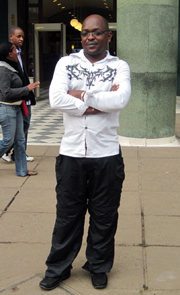The chorus of voices opposing the South African government’s proposed Protection of Information Bill and state-backed ombudsman continue to grow. South Africa’s Business Day estimates the press produces three articles per day opposing what many journalists see as an attempt by the ruling party to muzzle investigative reporting. More than 30 editors from major papers published protest messages mid-month calling on the government to abandon the planned legislation. But the South African media has yet to coordinate a mass protest comparable to that successfully orchestrated by Kenyan journalists in 2007 against the country’s media bill. And President Jacob Zuma, infamous for issuing defamation suits against a critical South African press, may not back down easily in the face of public criticism.
In Kenya, a mass protest in August 2007 by hundreds of media practitioners quashed an amendment to the 2005 Media Act that would have compelled editors to reveal their sources. “I never saw so many journalists in Kenya,” recalls Sammy Mbau, who helped organize the protests with a group of colleagues. Wearing gags and walking in an eerily silent protest, journalists marched through Kenya’s capital from Freedom Corner in Uhuru Park to the parliament. “We circled around parliament while they were in session,” Mbau told me. “They actually stopped the session and the assistant information minister, Koigi Wamwere, locked the gate to prevent us coming in.”
Kenyan journalists had planned further protests–including keeping the front pages of all major newspapers blank on all major papers and having TV newscasters wear gags on camera. But President Mwai Kibaki recalled the bill just hours after the protest march. Unlike Zuma, Kibaki faced a re-election bid and a diverse ruling party with members sympathetic to the press. “The African National Congress is one solid unit that can decide to be dictatorial,” said Tervil Okoko, the former chair of the Kenyan Union of Journalists and part of the protest organizing team. “So they will have to act with one voice to get anywhere.”
Similar to the South African press, the feisty Kenyan media has only developed its voice in the past decade. “Both countries come from a history of censorship, so ideas of press freedom and self-regulation are very nascent,” Okoko told me. Fiscal constraints also ensured that politicians under former Kenyan President Daniel Arap Moi were dealing with a complacent, purchased press. “But after the 2002 elections, a patriotic wave swept the nation,” Mbau said, “and journalists started serving the interests of their audience–not the politicians.”
Mbau believes the South African press will need more than a protest march by the media. “Everyone in South Africa needs to be involved in condemning the government’s media plans. The public needs to realize that censorship affects everyone. Yes, the South African government is trying to muzzle the press, but also its citizens.”
